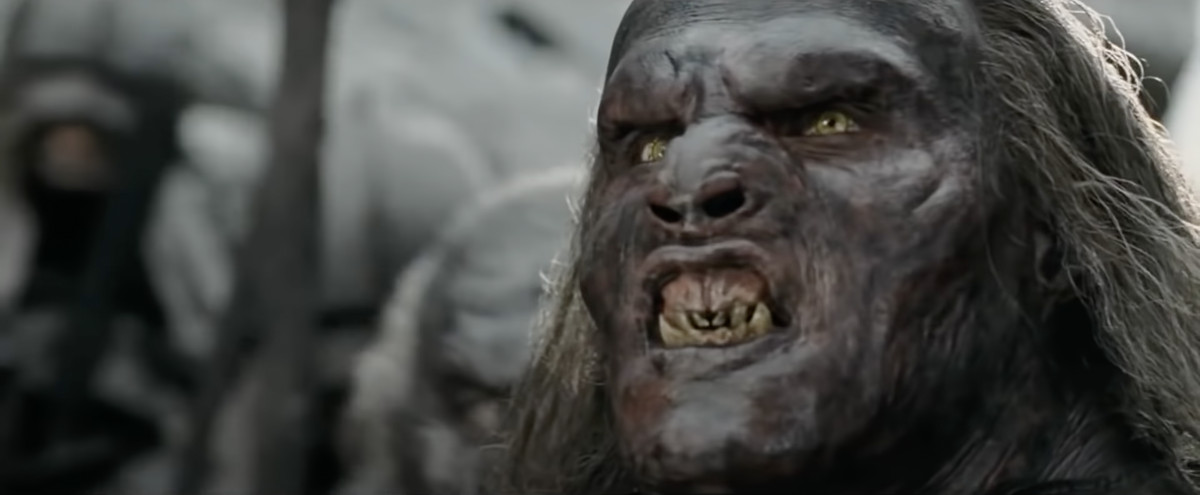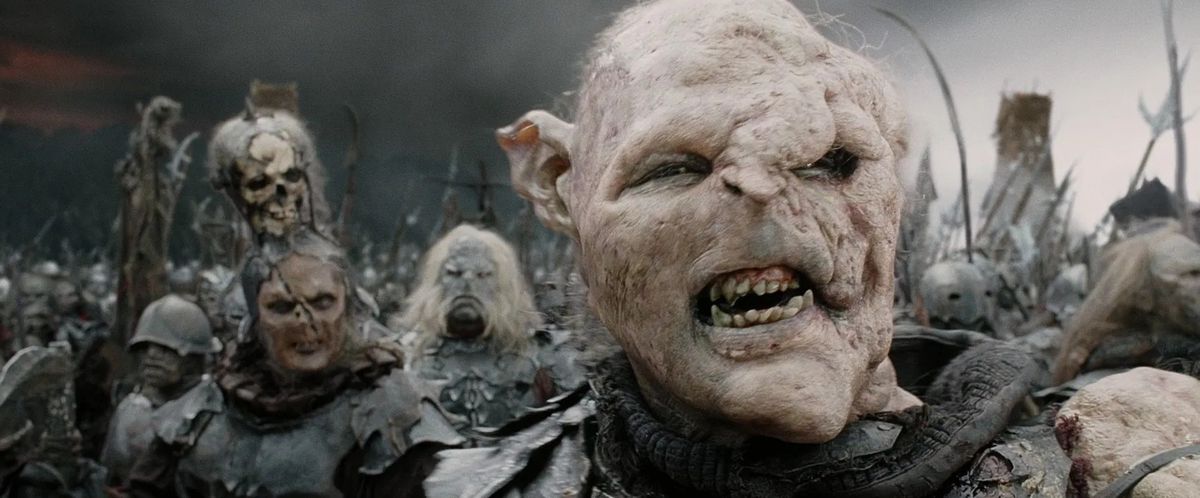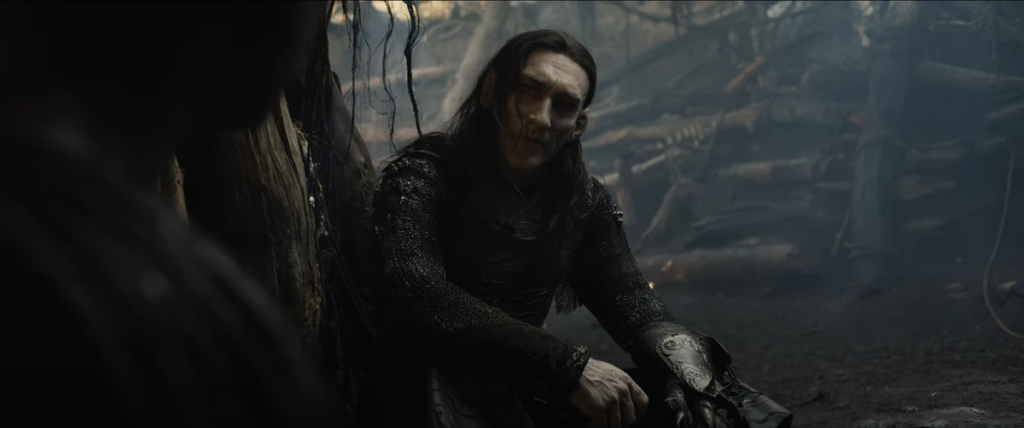This week’s The Lord of the Rings: The Rings of Power delves into the deepest of Tolkien lore and the far-flung dawn of sentient life on Middle-earth to touch on a question not even the professor himself could answer: Where do orcs come from?
[Ed. note: This piece contains spoilers for The Lord of the Rings: The Rings of Power episode 6.]
Image: Prime Video
Many plot threads collide in “Udûn,” the third-to-last episode in the first season of Rings of Power — most notably for our purposes, Galadriel comes face to face with Adar, the elf-like being whom the orcs besieging Ostirith call father.
“When I was a child,” she tells him, meaning a very, very long time ago, “I heard stories of elves taken by Morgoth; tortured, twisted, made into a new and ruined form of life. You are one of them, are you not? The Moriondor. The sons of the dark. The first orcs.” To her, orcs are “a mistake, made in mockery” of life.
Adar replies that he prefers to be called an “uruk,” and insists that his “children” have no master, no longer work for Sauron or Morgoth, and deserve their own place in the — well, not in the sun, exactly. “Each one has a name,” he counters her, “a heart. We are creations of the One, Master of the Secret Fire, the same as you. As worthy of the breath of life and just as worthy of a home.”
With this scene, Rings of Power is picking up a puzzle box not even Tolkien solved: The origin of orcs. But before we talk about the lore at work here, let’s define some of those very Middle-earth terms Adar threw out there.
What does uruk mean?

Image: New Line Cinema
“Uruk” is a sound familiar to anyone who remembers the menacing uruk-hai of Peter Jackson’s The Lord of the Rings trilogy. It simply means “orc” in the Black Speech of Mordor, which is another way of saying it’s what orcs call themselves in their own tongue. (Uruk-hai basically means “orc-people” or “orc-folk.” Also Orc Folk is my favorite musical subgenre.)
The “One” refers to Eru Ilúvatar, the supreme god of Middle-earth, who created the world, its gods — the Valar — and its mortal inhabitants (elves, men, etc.). The “Secret Fire” is the divine force Eru wielded to create something from nothing, but it is especially considered to be the ability that creates sentient life, that forges living beings with souls and personhood from mere animal flesh. Eru is called the Master of the Secret Fire because he alone had the power to create new life.
Which begs the question: If only Eru can make people, who made the orcs?
Where do orcs come from?
The short answer is: Tolkien never really decided on an answer to this, because he couldn’t find a way to fix the inherent problem with the concept of a “monstrous race of sentients” before he died.
Galadriel’s idea of orcs’ origin in The Rings of Power is quite close to that of The Silmarillion. Compiled and published posthumously by Tolkien’s son Christopher, it says that “little is known of a certainty,” but it was “held true by the wise” that Morgoth made the orcs “by slow arts of cruelty” performed on elves captured in the dark days before the Valar were able to find them. The minds and bodies of these oldest elves were “corrupted and enslaved” into orcs “in envy and mockery of the Elves” — Morgoth’s envy of Eru’s singular ability to create life. “Deep in their dark hearts, the Orcs loathed the Master whom they served in fear, the maker only of their misery. This it may be was the vilest deed of Melkor, and the most hateful to Ilúvatar.”
The longer answer is Tolkien devised multiple explanations for the origin of orcs and may well have come up with others if he had had more time. In early drafts of his legendarium, Morgoth created the orcs from stone. In the 1950s, Tolkien wrote the version that Christopher chose for The Silmarillion, in which it was generally believed that the first orcs were corrupted elves.
But in later years, Tolkien began to grapple with sweeping and fundamental revisions to Middle-earth’s cosmology that he was ultimately never able to finish or finalize. And in these years, he seems to have seen the contradiction of it being totally heroic to slaughter orcs at any opportunity, even though, in The Hobbit and The Lord of the Rings, they appeared to have free will.

Image: New Line Cinema
After all, Tolkien’s orcs had military ranks. They argued among themselves, grumbled about their orders, and cracked sadistic little jokes. In a lot of ways, they were the product of Tolkien’s most harrowing personal experiences as a footsoldier in the British army of WWI: a people perpetually in, and welcoming of, war, bureaucracy, and petty obedience, without a sense of community or solidarity other than taking orders. Mordor was a foxhole, full of the worst people and the worst officers, war without brotherhood or honorable cause except “the boss told you to.”
In his new origins for orcs, Tolkien explored the idea that orcs could have been created from corrupted humans, elves, disembodied spirits, and beasts — taken by Morgoth and fashioned into a conglomerate mockery of Eru’s creations. In these origins, the dark god and source of all evil imbued them with his own will and nature, so that they might bicker and even betray him, but only because they were driven by his universal hatred of all living things, including themselves.
Tolkien was operating on the principles of a guy who vocally abhorred apartheid and Nazi Germany, but unfortunately all he had to work with were the tools of a Catholic Englishman born in South Africa in the final days of the Victorian era. No matter if orcs are made from stone, or beasts, or corrupted mortals, each origin is just a fictionalized version of the sorts of stories racists have always come up with to explain why it’s OK to brutalize the fellow human beings they’re brutalizing. The idea that a category of person can be inherently evil — the “monster race” — is the thorn embedded in the heart of much of the fantasy media that grew from Tolkien’s work, in ways that are still being unpacked and untangled today.

